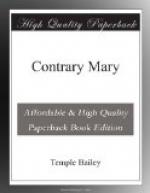In his earnestness he had struck a genuine note, and she recognized it.
“I know,” she said, unsteadily. “I believe that you think you are fighting my battle, instead of your own. But I don’t think Roger Poole would—lie.”
“Not consciously. But he’d create the wrong impression—we can never see our own faults—and he would blame her, of course. But the man who has made one woman unhappy would make another unhappy, Mary.”
Mary was shaken.
“Please don’t put it so—inevitably. Roger hasn’t any claim on me whatever.”
“Hasn’t he? Oh, Mary, hasn’t he?”
There was hope in his voice, and she shrank from it.
“No,” she said, gently, “he is just—my friend. As yet I can’t believe evil of him. But I don’t love him. I don’t love anybody—I don’t want any man in my life.”
She thought that she meant it. She thought it, even while her heart was crying out in defense of the man he had maligned.
“How can one know the truth of such a thing?” she went on, unsteadily. “One can only believe in one’s friends.”
“Mary,” eagerly, “you’ve known Poole only for a few months. You’ve known me always. I can give you a devotion equal to anybody’s. Why not drop all this contrariness—and come to me?”
“Why not?” she asked herself. Roger Poole was obscure, and destined to be obscure. More than that, there would always be people like Porter who would question his past. “It is the whispers that kill,” Roger had said. And people would always whisper.
She rose and walked to the end of the porch. Porter followed her, and they stood looking down into the garden. It was in a riot of summer bloom—and the fragrance rushed up to them.
The garden! And herself a flower! It was such things that Roger Poole could say, and which Porter could never say. And he could not say them because he could not think them. The things that Porter thought were commonplace, the things which Roger thought were wonderful. If she married Porter Bigelow, she would walk always with her feet firmly on the ground. If she married Roger Poole they would fly in the upper air together.
“Mary,” Porter was insisting, “dear girl.”
She held up her hand. “I won’t listen,” she said, almost passionately; “don’t imagine things about me, Porter. I have my work—and my freedom—I won’t give them up for anybody.”
If she said the words with something less than her former confidence he was not aware of it. How could he know that she was making a last desperate stand?
When at last she sent him away, he went with an air of depression which touched her.
“I’ve risked being thought a cad,” he said, “but I had to do it.”
“I know. I don’t blame you, dear boy.”
She gave him her hand upon it, and he went away, and she was left alone in the moonlight.




